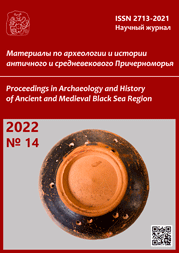Рецензия на книгу: Щавелев А.С. 2020. Хронотоп державы Рюриковичей (911—987). Москва: Аквалон
Book review: Shchavelev, A.S. 2020. Chronotope of the Rurikid Polity (911—987). Moscow: Akvilon
Author(s): Alexander G. EmanovSubject(s): History
Published by: Нижневартовский государственный университет
Keywords: Rurikid; Polity; Chronotope; Rus’; Rusia; Leo VI the Wise; “Tactics”; Constantine VII Porphyrogenitus; “De administrando Imperio”; Hasdai ibn Shaprut
Summary/Abstract: The Review deals with Concept of Rurikid’s Polity of the 10th c., proposed by Aleksei Shchavelev, Senior Researcher at the Center for Eastern Europe in the Ancient and Medieval World, Department of the History of Byzantium and Eastern Europe, Institute of General History, Russian Academy of Sciences, parses its Chronology and spatial Structure, the Genealogy of the early Rurikids and the Dynamics of their territorial Power. The Concept of “Polity” replaces the previous irrelevant for pre-Christian Times Notions “Ancient Russia”, “Kievan Rus”, and “Ancient Russian State”. As a Basis for Reconstruction of Rurikid Polity in 10th c. served not so much “Primary Chronicle”, which Chronology Causes all increasing Criticism, as “Tactics” by the Byzantium Emperor Leo VI the Wise, a Treatise “De administrando Imperio” by the Emperor Constantine VII Porphyrogenitus, letters of Adviser of Cordoba Caliphate’s Grandee Hasdai ibn Shaprut and others. This Polity emerged as a Result of stochastic Fluctuations in ethno-social, event and personal History.
Journal: Материалы по археологии и истории античного и средневекового Причерноморья
- Issue Year: 2022
- Issue No: 14
- Page Range: 435-441
- Page Count: 7
- Language: Russian

